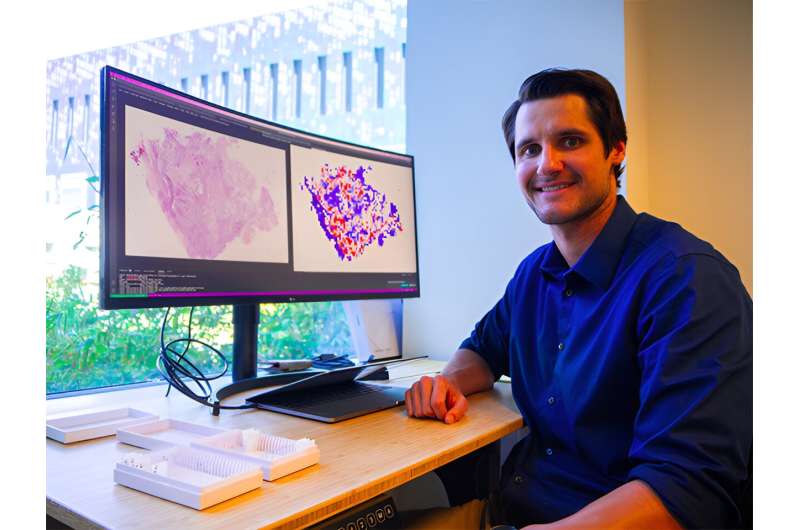This article has been reviewed according to Science X's editorial process and policies. Editors have highlighted the following attributes while ensuring the content's credibility:
fact-checked
peer-reviewed publication
trusted source
proofread
AI tool 'DeepHRD' accelerates cancer treatment decisions

A new generation of artificial intelligence (AI) tools designed to allow rapid, low-cost detection of clinically actionable genomic alterations directly from tumor biopsy slides has been developed by a team led by engineers and medical researchers at University of California San Diego.
A paper describing the new AI protocol for examining routine biopsies, called DeepHRD, appears in the Journal of Clinical Oncology.
Senior author Ludmil Alexandrov, Ph.D., professor of bioengineering and professor of cellular and molecular medicine at UC San Diego, says the new method is designed to save weeks and thousands of dollars from clinical oncology treatment workflows for breast and ovarian cancers.
The team says their work represents an enormous step forward in the global efforts to eliminate the delays and health inequalities that have confounded the promise of precision medicine for cancer patients. The big picture is to develop new AI tools that can complement or replace the expensive and time-consuming genomic testing required to determine the best first-line cancer treatment specific for each individual patient.
"A cancer patient today can expect to wait crucial weeks after their initial tumor diagnosis for a standard genomic test, resulting in life-threatening delays in treatment," said Alexandrov. "It is very concerning that high costs and time delays render lifesaving treatment protocols inaccessible for most patients, disproportionately impacting resource-constrained settings."
At UC San Diego, this work represents a collaboration spanning all across campus, including the Department of Cellular and Molecular Medicine in the UC San Diego School of Medicine, the Shu Chien-Gene Lay Department of Bioengineering at the UC San Diego Jacobs School of Engineering, Institute of Engineering in Medicine, Department of Medicine, and the UC San Diego Moores Cancer Center.
It was the potential of precision oncology to tailor an individual patient's treatment options that motivated the collaborators, said Erik Bergstrom, Ph.D., lead author of the study and a postdoctoral researcher in Alexandrov's lab, which bridges bioengineering and medicine.
"Unfortunately, high costs, tissue requirements and slow turnaround times have hindered the widespread use of precision oncology, leading to suboptimal—potentially detrimental—treatment for cancer patients," Bergstrom said. "We wanted to see if we could develop a completely different approach to resolve this serious issue by designing AI to circumvent the need for genomic testing."
Bergstrom said the collaborators focused on leveraging the minimum amount of patient information that is available early in the diagnostic process. He explained that virtually every cancer patient undergoes a tumor biopsy, a tissue sample that is routinely processed and examined through a light microscope. The process was developed in the late 19th century and is still the standard backbone of early clinical oncology workflows today.
"Our AI, applied directly to a traditional tissue slide, allows accurate, instantaneous detection of cancer genomic biomarkers," Bergstrom said. He explained that the team focused on AI identification of a specific biomarker for homologous recombination deficiency (HRD), a condition in which a cancerous cell loses a specific DNA damage repair mechanism.
Bergstrom pointed out that patients with ovarian or breast cancers harboring HRD generally respond well to platinum and PARP (poly-ADP ribose polymerase) therapies, two common forms of chemotherapy.
"This AI approach saves the patient critical time," Alexandrov added. "Oncologists can prescribe treatment immediately after initial tissue diagnosis. Remarkably, the AI test has a negligible failure rate, while current genomic tests have a failure rate of 20 to 30 percent, necessitating re-testing, or even invasive re-biopsy."
The study's co-senior author Scott Lippman, M.D., UC San Diego distinguished professor of medicine, Center for Engineering and Cancer, and Moores Cancer Center member, said the new technology will remove barriers of time and money to allow immediate, universal access and equality to actionable genomic biomarker detection—required for precision therapy—for people with advanced cancers. The extraordinary aspect of this breakthrough AI, is that it will benefit highly informed and resourced populations, and remarkably, will close the severe disparity gap in precision medicine, especially in resource-constrained, remote regions worldwide where testing is not yet extant.
"The era of precision oncology took off in the late '90s, but recent U.S. studies show that the vast majority of cancer patients are not getting FDA-approved precision therapy," Lippman said. "And the prime reason is because they're not getting tested. As a clinical oncologist—and I've been doing this for nearly 40 years—there is no question that this approach is the future of precision oncology."
The AI technology behind DeepHRD is protected by provisional patents through UC San Diego, which have been licensed to io9, a company with strong involvement by Alexandrov, Bergstrom and Lippman, and the goal to move this AI platform into the clinical arena as quickly as possible to make precision therapy real for patients with cancer by getting them onto the precise treatments they need faster. The authors expect that the same technology could be applied to most other genomic biomarkers and many forms of cancer.
More information: Erik N. Bergstrom et al, Deep Learning Artificial Intelligence Predicts Homologous Recombination Deficiency and Platinum Response From Histologic Slides, Journal of Clinical Oncology (2024). DOI: 10.1200/JCO.23.02641




















